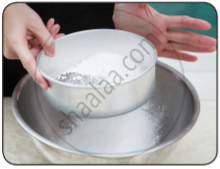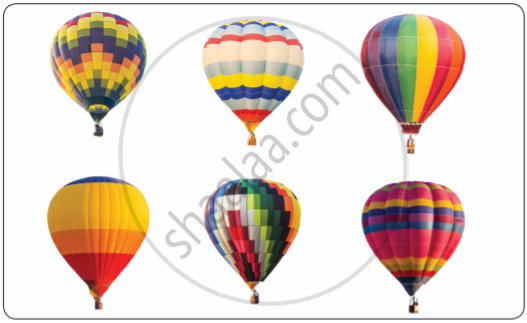Advertisements
Online Mock Tests
Chapters
![Samacheer Kalvi solutions for Science - Term 1 [English] Class 6 TN Board chapter 3 - Matter around Us Samacheer Kalvi solutions for Science - Term 1 [English] Class 6 TN Board chapter 3 - Matter around Us - Shaalaa.com](/images/science-term-1-english-class-6-tn-board_6:5f2b1b2038084cf381bfa42c826a928c.jpg)
Advertisements
Solutions for Chapter 3: Matter around Us
Below listed, you can find solutions for Chapter 3 of Tamil Nadu Board of Secondary Education Samacheer Kalvi for Science - Term 1 [English] Class 6 TN Board.
Samacheer Kalvi solutions for Science - Term 1 [English] Class 6 TN Board 3 Matter around Us Evaluation [Pages 50 - 53]
Choose the correct answer.
______ is not made of matter.
Gold ring
Iron nail
Light ray
Oil drop
200 ml of water is poured into a bowl of 400 ml capacity. The volume of water will be ______.
400 ml
600 ml
200 ml
800 ml
Seeds from water-melon can be removed by ______
hand-picking
filtration
magnetic separation
decantation
Lighter impurities like dust when mixed with rice or pulses can be removed by ______.
filtration
sedimentation
decantation
winnowing
______ is essential to perform winnowing activity.
Rain
Soil
Water
Air
Filtration method is effective in separating ______ mixture.
solid-solid
solid-liquid
liquid-liquid
liquid-gas
Among the following ______ is not a mixture.
coffee with milk
lemon juice
water
ice cream embedded with nuts
Fill in the blanks.
Matter is made up of ______.
In solids, the space between the particles is less than in ______.
Grains can be separated from their stalks by ______.
Chillies are removed from ‘Upma’ by ______ method.
The method employed to separate clay particles from water is ______.
Water obtained from tube wells is usually ______ water.
Which among the following ______ will get attracted to by magnet?
safety pins
pencil
rubber band
State True or False. If false, correct the statement.
Air is not compressible.
True
False
Liquids have no fixed volume but have fixed shape.
True
False
Particles in solids are free to move.
True
False
When pulses are washed with water before cooking, water is separated from them by filtration.
True
False
Strainer is a kind of sieve which is used to separate a liquid from solid.
True
False
Grain and husk can be separated by winnowing.
True
False
Air is a pure substance.
True
False
Butter from curd is separated by sedimentation.
True
False
Complete the given analogy.
Solid: Rigidity:: Gas: ______
Complete the given analogy.
Large Inter-particle space: Gas:: ______ :solid.
Complete the given analogy.
Solid: Definite shape:: ______: Shape of the vessel.
Complete the given analogy.
Husk-Grains : Winnowing :: Sawdust-Chalk piece : ______
Complete the given analogy.
Murukku from hot oil: ______:: Coffee powder residue from decoction: ______
Complete the given analogy.
Iron – sulphur mixture : ______:: Mustard seeds from Urad-dhal: Rolling
Match the following.
| Property | Example |
| Breaks easily (Brittle) | Metal pan |
| Bends readily | Rubber band |
| Can be stretched easily | Cotton wool |
| Gets compressed easily | Mud pot |
| Gets heated readily | Plastic wire |
Match the following.
| Srl. no. | A | B | C |
| i | Separation of visible undesirable components | Water mixed with chalk powder | Magnetic Separation |
| ii | Separation of heavier and lighter components | Sand and water | Decantation |
| iii | Separation of insoluble impurities | Iron impurities | Filtration |
| iv | Separation of magnetic components from non-magnetic components | Rice and stone | Hand-picking |
| v | Separation of solids from liquids | Husk and paddy | Winnowing |
Answer very briefly.
Define the term matter.
How can husk or fine dust particles be separated from rice before cooking?
Why do we separate mixtures?
Give an example for mixture and justify your answer with reason.
Define - Sedimentation.
Give the main difference between a pure substance and an impure substance.
Answer briefly.
A rubber ball changes its shape on pressing. Can it be called a solid?
Why do gases not have fixed shape?
What method will you employ to separate cheese (paneer) from milk? Explain.
Look at the picture given below and explain the method of separation illustrated.

How can you separate a large quantity of tiny bits of paper mixed with pulses/dal?
What is meant by food adulteration?
Mr. Raghu returns home on a hot summer day and wants to have buttermilk. Mrs. Raghu has the only curd. What can she do to get buttermilk? Explain
Higher Order Thinking Questions.
Distinguish the properties of solid, liquid, and gas. Draw a suitable diagram.
Using suitable apparatus from your laboratory separate the mixture of chalk powder, mustard oil, water, and coins. Draw a flow chart to show the separation process.
Justify your answer.
| Figure 1 | Figure 2 | Figure 3 |
 |
 |
 |
The arrangement of particles in three different phases of matter is shown above.
- Which state is represented by Fig. 1?
- In which state will the inter-particle attraction be maximum?
- Which one of them cannot be contained in an open vessel?
- Which one can take the shape of its container?
Malar’s mother was preparing to cook dinner. She accidentally mixed ground nuts with urad-dhal. Suggest a suitable method to separate the two substances so that Malar can have ground nuts to eat.
In a glass containing some water, tamarind juice and sugar are added and stirred well. Is this a mixture? Can you tell why? Will this solution be sweet or sour or both sweet and sour?
Life Skills - Debate
Debate on 'Food adulteration and detection'
Field Trip
Visit a nearby paddy field and rice mill and note down the different separating techniques used there. Is technology replacing some traditional practices?
Sequence Type
Write the sequence of steps you would use for making tea. (Use the words: mixture, dissolve, filtrate and residue).
Topic enrichment – Project
Make a fruit or vegetable salad. Give reasons why you think it is a mixture.
Connect with sports Air is not a pure substance. It helps us in many ways from breathing to playing. Balloon sports are a very popular sport. Hot air is lighter than cool air. So, the balloons filled with hot air rise up. Find out more about hot air balloons.

Solutions for 3: Matter around Us
![Samacheer Kalvi solutions for Science - Term 1 [English] Class 6 TN Board chapter 3 - Matter around Us Samacheer Kalvi solutions for Science - Term 1 [English] Class 6 TN Board chapter 3 - Matter around Us - Shaalaa.com](/images/science-term-1-english-class-6-tn-board_6:5f2b1b2038084cf381bfa42c826a928c.jpg)
Samacheer Kalvi solutions for Science - Term 1 [English] Class 6 TN Board chapter 3 - Matter around Us
Shaalaa.com has the Tamil Nadu Board of Secondary Education Mathematics Science - Term 1 [English] Class 6 TN Board Tamil Nadu Board of Secondary Education solutions in a manner that help students grasp basic concepts better and faster. The detailed, step-by-step solutions will help you understand the concepts better and clarify any confusion. Samacheer Kalvi solutions for Mathematics Science - Term 1 [English] Class 6 TN Board Tamil Nadu Board of Secondary Education 3 (Matter around Us) include all questions with answers and detailed explanations. This will clear students' doubts about questions and improve their application skills while preparing for board exams.
Further, we at Shaalaa.com provide such solutions so students can prepare for written exams. Samacheer Kalvi textbook solutions can be a core help for self-study and provide excellent self-help guidance for students.
Concepts covered in Science - Term 1 [English] Class 6 TN Board chapter 3 Matter around Us are Matter (Substance), Characteristics of Particles (Molecules) of Matter, States of Matter, The Solid State, The Liquid State, The Gaseous State, Natural substances, Pure Substances, Elements, Compound, Impure Substance, Mixture, Separation of Mixtures, Methods of Separation, Filtration Method, Sieving Method, Churning Method, Threshing Method, Winnowing Method, Food Adulteration, Handpicking Method, Magnetic Separation Method, Sedimentation Method, Decantation Method.
Using Samacheer Kalvi Science - Term 1 [English] Class 6 TN Board solutions Matter around Us exercise by students is an easy way to prepare for the exams, as they involve solutions arranged chapter-wise and also page-wise. The questions involved in Samacheer Kalvi Solutions are essential questions that can be asked in the final exam. Maximum Tamil Nadu Board of Secondary Education Science - Term 1 [English] Class 6 TN Board students prefer Samacheer Kalvi Textbook Solutions to score more in exams.
Get the free view of Chapter 3, Matter around Us Science - Term 1 [English] Class 6 TN Board additional questions for Mathematics Science - Term 1 [English] Class 6 TN Board Tamil Nadu Board of Secondary Education, and you can use Shaalaa.com to keep it handy for your exam preparation.
